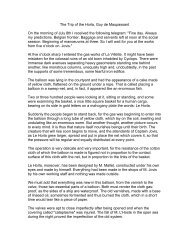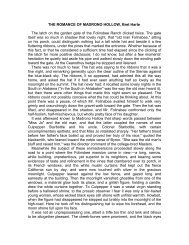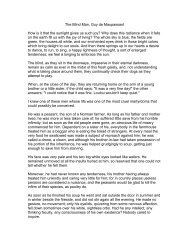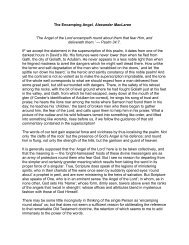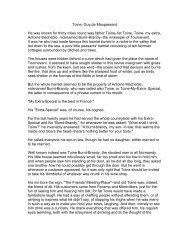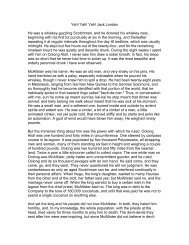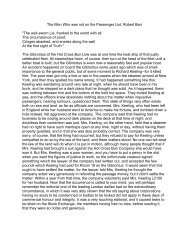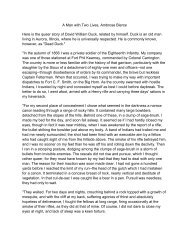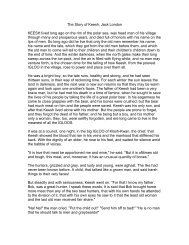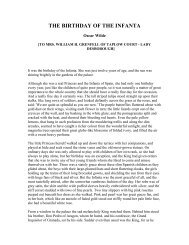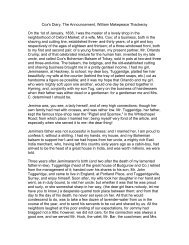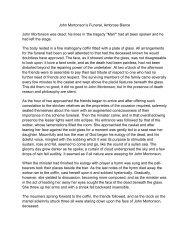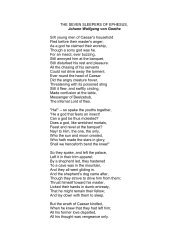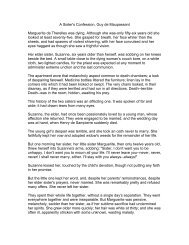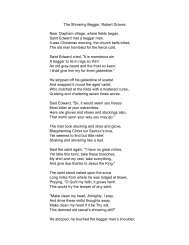THE MAN WHO LOVED HIS KIND, Virginia Woolf Trotting through ...
THE MAN WHO LOVED HIS KIND, Virginia Woolf Trotting through ...
THE MAN WHO LOVED HIS KIND, Virginia Woolf Trotting through ...
Create successful ePaper yourself
Turn your PDF publications into a flip-book with our unique Google optimized e-Paper software.
piped up, how it was all due to him they felt. And they deeply appreciated his generosity—because, of course, he hadn’t taken a fee.And as he took the clock and put it on the middle of his mantelpiece, he had felt that hewished nobody to see his face. That was what he worked for—that was his reward; andhe looked at the people who were actually before his eyes as if they danced over thatscene in his chambers and were exposed by it, and as it faded—the Brunners faded—there remained as if left of that scene, himself, confronting this hostile population, aperfectly plain, unsophisticated man, a man of the people (he straightened himself) verybadly dressed, glaring, with not an air or a grace about him, a man who was an ill handat concealing his feelings, a plain man, an ordinary human being, pitted against the evil,the corruption, the heartlessness of society. But he would not go on staring. Now he puton his spectacles and examined the pictures. He read the titles on a line of books; forthe most part poetry. He would have liked well enough to read some of his oldfavourites again—Shakespeare, Dickens—he wished he ever had time to turn into theNational Gallery, but he couldn’t—no, one could not. Really one could not—with theworld in the state it was in. Not when people all day long wanted your help, fairlyclamoured for help. This wasn’t an age for luxuries. And he looked at the arm chairs andthe paper knives and the well bound books, and shook his head, knowing that he wouldnever have the time, never he was glad to think have the heart, to afford himself suchluxuries. The people here would be shocked if they knew what he paid for his tobacco;how he had borrowed his clothes. His one and only extravagance was his little yacht onthe Norfolk Broads. And that he did allow himself, He did like once a year to get rightaway from everybody and lie on his back in a field. He thought how shocked they wouldbethese fine folk—if they realized the amount of pleasure he got from what he was. oldfashioned enough to call the love of nature; trees and fields he had known ever since hewas a boy.These fine people would be shocked. Indeed, standing there, putting his spectaclesaway in his pocket, he felt himself grow more and more shocking every instant. And itwas a very disagreeable feeling. He did not feel this—that he loved humanity, that hepaid only fivepence an ounce for tobacco and loved nature—naturally and quietly. Eachof these pleasures had been turned into a protest. He felt that these people whom hedespised made him stand and deliver and justify himself. “I am an ordinary man,” hekept saying. And what he said next he was really ashamed of saying, but he said it. “Ihave done more for my kind in one day than the rest of you in all your lives.” Indeed, hecould not help himself; he kept recalling scene after scene, like that when the Brunnersgave him the clockhe kept reminding himself of the nice things people had said of hishumanity, of his generosity, how he had helped them. He kept seeing himself as thewise and tolerant servant of humanity. And he wished he could repeat his praises aloud.It was unpleasant that the sense of his goodness should boil within him. It was still moreunpleasant that he could tell no one what people had said about him. Thank the Lord,he kept saying, I shall be back at work to–morrow; and yet he was no longer satisfiedsimply to slip <strong>through</strong> the door and go home. He must stay, he must stay until he hadjustified himself. But how could he? In all that room full of people, he did not know a soulto speak to.



